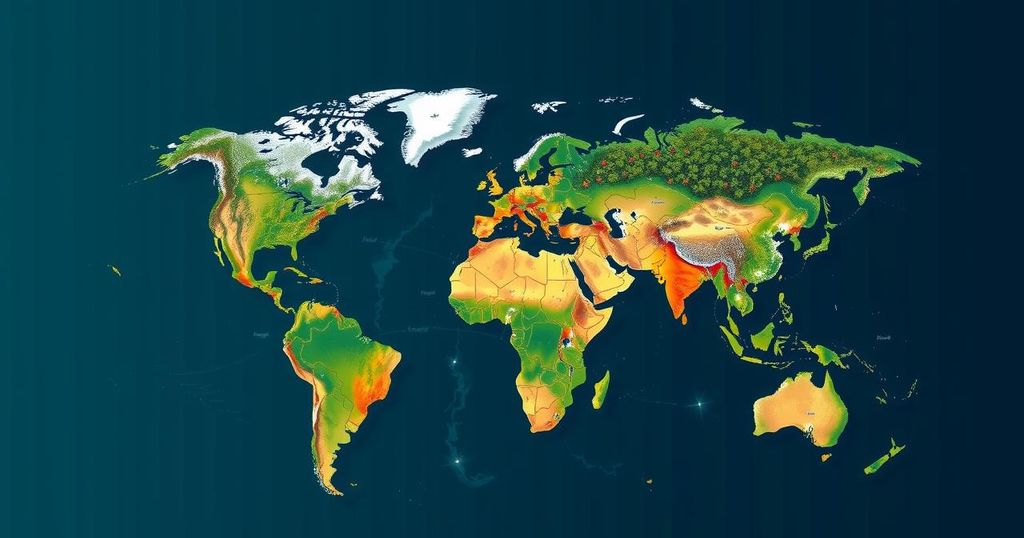The article discusses the urgent call for a systemwide response to climate change amidst the 80th anniversary of the Bretton Woods institutions. It highlights three main challenges: the crisis of the global commons, the urgency for collective action, and the slow progress made in addressing these issues. The article emphasizes the need for comprehensive governance reforms, particularly focusing on the roles of both public and private sectors in combating climate change and mobilizing necessary financial resources.
The year 2024 marks the 80th anniversary of the establishment of the Bretton Woods institutions, which were designed to manage international economic systems post-World War II. Throughout these decades, these institutions have contributed to significant global economic growth and poverty alleviation across many nations, notably China, India, and Indonesia. However, their progress faces imminent threats from three primary challenges. Firstly, the global commons crisis spans several cross-national issues, including climate change, pandemics, and technological disruptions, all of which negatively impact the global economy. Secondly, the urgency of these challenges necessitates collective action, yet significant cooperation has faltered. Lastly, despite recognizing these issues, stakeholders perceive that efforts directed at resolving them remain inadequate and sluggish. The barriers to effective action are rooted in complexities that have emerged over time. The challenges related to global commons have amplified, with climate change presenting a particularly critical concern. Geopolitical fragmentation and tensions exacerbate these challenges, hindering collaboration. The COVID-19 pandemic disrupted established patterns of global trade and financial globalization, leading to increased geopolitical competition and rising protectionism. Furthermore, the International Monetary Fund (IMF) estimates that the toll of fragmentation could equate to a reduction in global GDP of between 2 to 7 percent. Projections indicate that within the next several decades, the majority of global economic growth will originate from the Global South, regions that are notably vulnerable to adverse climate change effects. As such, it poses the question of how to sustain global growth amid the challenges faced by emerging economies. China stands as a pivotal player in addressing climate change, having made significant strides in emissions management. Its leadership is crucial not only for the growth of Asian economies but also for lower-income nations. The private sector is vital in financing the needed climate action, with projected funding requirements ranging between $3 to $4 trillion annually. Identifying systemic shortcomings in both public and private domains is essential to facilitating progress, particularly in governance, implementation, and accountability. The need for a unified approach to climate change becomes clearer in light of the absence of a dedicated institution to manage global climate policies effectively, despite existing frameworks like the UN Framework Convention on Climate Change. Currently, the discourse raises questions about the necessity of establishing a new institution to bridge these gaps. Given the existing geopolitical climate, achieving consensus on a new institution’s mission and structure appears challenging. Addressing climate change is now more about executing the technical solutions already available rather than their feasibility. Immediate focus should pivot toward orchestrating initiatives that establish priorities for mitigation and adaptation while mobilizing the requisite financial resources. Strategic participation from the private sector can be incentivized through global carbon trading schemes, decarbonization initiatives, and effective taxation policies that include equitable adjustments for developing countries. Additionally, the IMF and the World Bank’s involvement in fostering global carbon markets and the implementation of carbon pricing mechanisms is critically important for the necessary system evolution. Lastly, the prevailing architecture of voluntary corporate disclosures related to sustainability lacks oversight and efficacy, necessitating market regulators to ensure consistency in environmental disclosures aligned with corporate financial statements. In summary, climate change constitutes the foremost challenge confronting the global community. Bridging gaps in governance, implementation, and accountability is imperative, necessitating a collaborative effort between public and private sectors to advance a system-wide response to this crisis.
Climate change poses an existential threat to global stability, affecting economies, societies, and the environment. As nations strive to enhance their economic development, they also grapple with the dire consequences of climate change, necessitating immediate action and collaboration on a global scale. The background of this article discusses longstanding economic frameworks and acknowledges both the progress and the obstacles that have emerged in addressing climate change. It underscores the importance of effective governance structures and cooperative initiatives to combat not only climate issues but also the broader implications posed by geopolitical tensions and economic fragmentation in an increasingly interconnected world.
The article emphasizes that while the Bretton Woods institutions have historically contributed to global growth and poverty reduction, the current climatic crises challenge their effectiveness. The collective action needed to address these crises has faltered due to geopolitical tensions and inadequate collaborative infrastructure. A systemic approach, which includes enhancing private sector involvement and improving governance frameworks, is critical in formulating solutions to mitigate climate change effectively. The need for cohesive policies and coordinated international efforts is paramount if we are to avert the worst effects of climate change and ensure sustained global economic growth.
Original Source: global.chinadaily.com.cn







